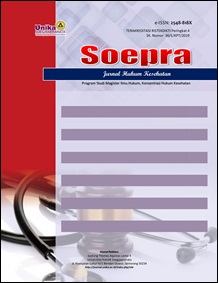Legal Protection to Commercial Sex Workers (PSK) Viewed From Reproductive Health Aspects at Pasar Kembang (Sarkem) Yogyakarta
Abstract
All women had equal rights to reproductive health, no exception for commercial sex workers (PSK), because PSK was a very risky job for various diseases, among others, gonorrhea, herpes, fungal infections, syphilis, vaginitis, ulcers, sex lice, and HIV/AIDS. However, in reality, not all PSKs got their rights to reproductive health. The Government had issued a regulation related to reproductive rights, namely Government Regulation Nr. 61 of 2014 on Reproductive Health.
This research used the socio-legal approach with the analytical- descriptive specification. The primary data were obtained from interviews with the Head of Public Health Center (Puskesmas) of Gedongtengen, doctors, midwives, coordinator of commercial sex workers association, AIDS Prevention Commission, the Head of Infectious Disease Control Section of the Health Office of Yogyakarta City, hotel owners and commercial sex workers (PSK). Secondary data were obtained from books and legal materials having relations with the research. The data gathered were then qualitatively analyzed.
The results of the research at Puskesmas of Gedongtengen showed that PSK had obtained legal protection by the contents of articles of the prevailing legislation and the Minister of Health’s regulation. Puskesmas of Gedongtengen had reproductive health services programs such as clinical sexual services of sexually transmitted infections (STI) and voluntary counseling and testing (VCT). If by an examination a PSK was found HIV/AIDS positive, she would be referred to a hospital having facilities by her needs. On the one hand, the supporting factors of the implementation of legal protection to commercial sex workers regarding reproductive health included affordable costs of the Puskesmas, availability of competent health personnel, adequate facilities, and infrastructure, cross-sectoral cooperation, PSK involvement in the services provided. On the other hand, the inhibiting factors were the absence of specific legislative regulations on PSK, low-level education that led to lack of health examination awareness, a lot of the customers that refused to use condoms and the insufficient availability of skilled health personnel.
Keywords
Full Text:
PDFReferences
Arisita Eka Prasetyawati, 2011, Ilmu Kesehatan Masyarakat untuk Kebidanan Holistik, Yogyakarta, Nuha Medika.
Cecep Triwibowo, 2014, Etika dan Hukum Kesehatan, Yogyakarta, Nuha Medika.
Eny Retna Ambarwati,Y, Sriati Rismintari, 2009, Asuhan Kebidanan Komunitas, Yogyakarta, Nuha Medika.
Undang-Undang Dasar 1945
Undang-Undang Nomor 39 Tahun 1999 tentang Hak Asasi Manusia
Undang-Undang Nomor 36 Tahun 2009 tentang Kesehatan
Peraturan Pemerintah Nomor 61 Tahun 2014 tentang Kesehatan Reproduksi
DOI: https://doi.org/10.24167/shk.v4i2.1499
Refbacks
- There are currently no refbacks.
Copyright (c) 2018 SOEPRA







